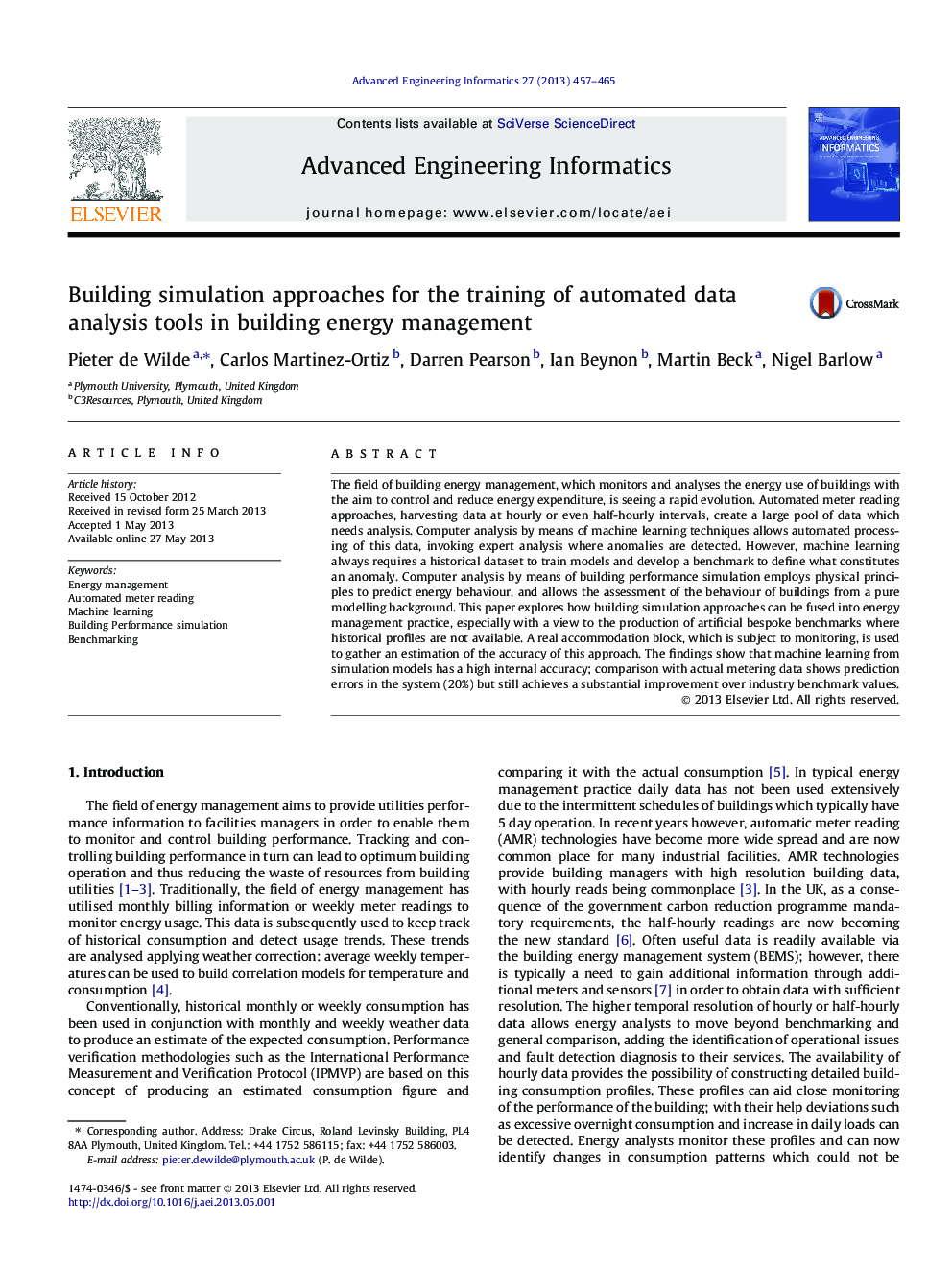| کد مقاله | کد نشریه | سال انتشار | مقاله انگلیسی | نسخه تمام متن |
|---|---|---|---|---|
| 10281766 | 501796 | 2013 | 9 صفحه PDF | دانلود رایگان |
عنوان انگلیسی مقاله ISI
Building simulation approaches for the training of automated data analysis tools in building energy management
ترجمه فارسی عنوان
روش های شبیه سازی ساختمان برای آموزش ابزارهای تجزیه و تحلیل خودکار داده ها در مدیریت انرژی ساختمان
دانلود مقاله + سفارش ترجمه
دانلود مقاله ISI انگلیسی
رایگان برای ایرانیان
کلمات کلیدی
مدیریت انرژی، خواندن اتوماتیک متر، فراگیری ماشین، شبیه سازی عملکرد ساختمان، معیار سنجش،
ترجمه چکیده
زمینه مدیریت انرژی ساختمان، نظارت و تجزیه و تحلیل استفاده از انرژی ساختمان ها با هدف کنترل و کاهش هزینه های انرژی، شاهد تکامل سریع است. رویکردهای خواندن اتوماتیک، جمع آوری داده ها در فواصل ساعتی یا حتی نیم ساعت، ایجاد یک مجموعه بزرگ داده که نیاز به تجزیه و تحلیل دارد. تجزیه و تحلیل کامپیوتر با استفاده از تکنیک های یادگیری ماشین امکان پردازش خودکار این داده ها را فراهم می کند، با استفاده از تجزیه و تحلیل متخصص در مواردی که ناهنجاری ها شناسایی می شوند. با این حال، یادگیری ماشین همیشه یک مجموعه داده تاریخی را فراهم می کند تا مدل ها را آموزش دهد و معیار مشخصی را برای تعریف یک ناهنجاری ایجاد کند. تجزیه و تحلیل کامپیوتر با استفاده از شبیه سازی عملکرد ساختمان، از اصول فیزیکی برای پیش بینی رفتار انرژی استفاده می کند و اجازه می دهد تا ارزیابی رفتار ساختمان ها از پس زمینه مدل سازی خالص. این مقاله به بررسی نحوه ایجاد رویکردهای شبیه سازی می شود تا در مدیریت انرژی، به خصوص با توجه به تولید معیارهای مصنوعی که در آن پروفیل های تاریخی در دسترس نیست، با هم ادغام شوند. یک بلوک مسکن واقعی که مورد نظارت قرار گرفته است، برای جمع آوری برآورد دقت این روش استفاده می شود. یافته ها نشان می دهد که یادگیری ماشین از مدل های شبیه سازی دارای دقت داخلی بالا است؛ مقایسه با داده های اندازه گیری واقعی نشان می دهد خطاهای پیش بینی در سیستم (20٪)، اما هنوز هم یک پیشرفت قابل توجهی نسبت به مقادیر معیار صنعت است.
موضوعات مرتبط
مهندسی و علوم پایه
مهندسی کامپیوتر
هوش مصنوعی
چکیده انگلیسی
The field of building energy management, which monitors and analyses the energy use of buildings with the aim to control and reduce energy expenditure, is seeing a rapid evolution. Automated meter reading approaches, harvesting data at hourly or even half-hourly intervals, create a large pool of data which needs analysis. Computer analysis by means of machine learning techniques allows automated processing of this data, invoking expert analysis where anomalies are detected. However, machine learning always requires a historical dataset to train models and develop a benchmark to define what constitutes an anomaly. Computer analysis by means of building performance simulation employs physical principles to predict energy behaviour, and allows the assessment of the behaviour of buildings from a pure modelling background. This paper explores how building simulation approaches can be fused into energy management practice, especially with a view to the production of artificial bespoke benchmarks where historical profiles are not available. A real accommodation block, which is subject to monitoring, is used to gather an estimation of the accuracy of this approach. The findings show that machine learning from simulation models has a high internal accuracy; comparison with actual metering data shows prediction errors in the system (20%) but still achieves a substantial improvement over industry benchmark values.
ناشر
Database: Elsevier - ScienceDirect (ساینس دایرکت)
Journal: Advanced Engineering Informatics - Volume 27, Issue 4, October 2013, Pages 457-465
Journal: Advanced Engineering Informatics - Volume 27, Issue 4, October 2013, Pages 457-465
نویسندگان
Pieter de Wilde, Carlos Martinez-Ortiz, Darren Pearson, Ian Beynon, Martin Beck, Nigel Barlow,
